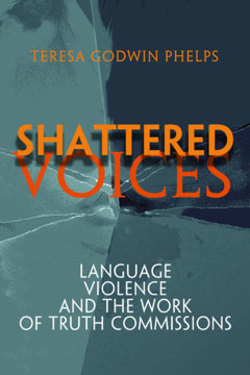Shattered Voices

Описание книги
Following periods of mass atrocity and oppression, states are faced with a question of critical importance in the transition to democracy: how to offer redress to victims of the old regime without perpetuating cycles of revenge. Traditionally, balance has been restored through arrests, trials, and punishment, but in the last three decades, more than twenty countries have opted to have a truth commission investigate the crimes of the prior regime and publish a report about the investigation, often incorporating accounts from victims. Although many praise the work of truth commissions for empowering and healing through words rather than violence, some condemn the practice as a poor substitute for traditional justice, achieved through trials and punishment. There has been until now little analysis of the unarticulated claim that underlies the truth commissions' very existence: that language—in this case narrative stories—can substitute for violence. Acknowledging revenge as a real and deep human need, Shattered Voices explores the benefits and problems inherent when a fragile country seeks to heal its victims without risking its own future. In developing a theory about the role of language in retribution, Teresa Godwin Phelps takes an interdisciplinary approach, delving into sources from Greek tragedy to Hamlet , from Kant to contemporary theories about retribution, from the Babylonian law codes to the South African Truth and Reconciliation Report. She argues that, given the historical and psychological evidence about revenge, starting afresh by drawing a bright line between past crimes and a new government is both unrealistic and unwise. When grievous harm happens, a rebalancing is bound to occur, whether it is orderly and lawful or disorderly and unlawful. Shattered Voices contends that language is requisite to any adequate balancing, and that a solution is viable only if it provides an atmosphere in which storytelling and subsequent dialogue can flourish. In the developing culture of ubiquitous truth reports, Phelps argues that we must become attentive to the form these reports take—the narrative structure, the use of victims' stories, and the way a political message is conveyed to the citizens of the emerging democracy. By looking concretely at the work and responsibilities of truth commissions, Shattered Voices offers an important and thoughtful analysis of the efficacy of the ways human rights abuses are addressed.
Отрывок из книги
Shattered Voices
Bert B. Lockwood, Jr., Series Editor
.....
One of these transitional steps took on some form of the lex talionis argument, the eye-for-an-eye principle that requires that the punishment exacted equal in both form and harshness the harm received. While often interpreted as a permissive doctrine, lex talionis sanctioned equal punishment, thereby imposing a limit upon the revenge that could be taken:58 a life for a life, an injury for an injury, property for property.59 Such limitations in theory provided end points for blood feuds; once the original harm was balanced, the feud ended. In practice, of course, the parties often disagreed as to what was a fair and adequate balancing, and the feud continued indefinitely. Another means of balancing the harm was a payment of money to the victim’s relative. As early as the eighteenth century B.C., for example, the Code of Hammurabi, while adhering generally to the principle of lex talionis, attempted to limit private revenge and blood feuds.60 Many wrongs could be compensated by payment (composition) to the victim’s family or clan, the amount varying with the offense and with the status of the victim.61 Among the Assyrians and the Hittites, a rich killer could have himself replaced by another or could buy his way out of blood revenge.62 The Pelagasians of ancient Greece practiced a “tribal wergeld.”63 In Anglo-Saxon societies, the wergeld, the worth of a man, could “buy off the spear”64 and was commonly used to avenge a death.65 The consolidated laws of the Germanic tribes describe sums of money as compensations for homicides.66
In all these practices, the state acknowledged the desire for revenge, keeping the Furies by Athena’s side, while it simultaneously worked to regulate and limit its fulfillment in action. The private settlements may be seen as an advancement over violence for violence yet these practices also met with disapproval and condemnation.67 Although the state vied to interfere and to regulate, at this time it still remained unthinkable for any authority outside the kinship group to act; the state had neither the power nor the approval of the people to take action68—until the emergence of the “pollution doctrine.”
.....
